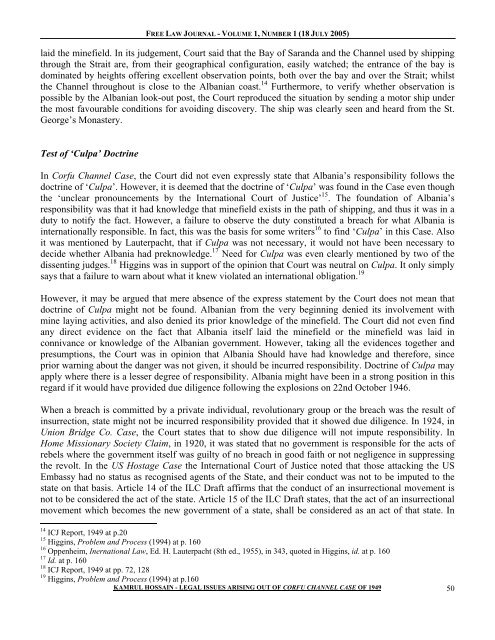Free_Law_Journal-Vol.. - Free World Publishing Inc.
Free_Law_Journal-Vol.. - Free World Publishing Inc.
Free_Law_Journal-Vol.. - Free World Publishing Inc.
You also want an ePaper? Increase the reach of your titles
YUMPU automatically turns print PDFs into web optimized ePapers that Google loves.
FREE LAW JOURNAL - VOLUME 1, NUMBER 1 (18 JULY 2005)<br />
laid the minefield. In its judgement, Court said that the Bay of Saranda and the Channel used by shipping<br />
through the Strait are, from their geographical configuration, easily watched; the entrance of the bay is<br />
dominated by heights offering excellent observation points, both over the bay and over the Strait; whilst<br />
the Channel throughout is close to the Albanian coast. 14 Furthermore, to verify whether observation is<br />
possible by the Albanian look-out post, the Court reproduced the situation by sending a motor ship under<br />
the most favourable conditions for avoiding discovery. The ship was clearly seen and heard from the St.<br />
George’s Monastery.<br />
Test of ‘Culpa’ Doctrine<br />
In Corfu Channel Case, the Court did not even expressly state that Albania’s responsibility follows the<br />
doctrine of ‘Culpa’. However, it is deemed that the doctrine of ‘Culpa’ was found in the Case even though<br />
the ‘unclear pronouncements by the International Court of Justice’ 15 . The foundation of Albania’s<br />
responsibility was that it had knowledge that minefield exists in the path of shipping, and thus it was in a<br />
duty to notify the fact. However, a failure to observe the duty constituted a breach for what Albania is<br />
internationally responsible. In fact, this was the basis for some writers 16 to find ‘Culpa’ in this Case. Also<br />
it was mentioned by Lauterpacht, that if Culpa was not necessary, it would not have been necessary to<br />
decide whether Albania had preknowledge. 17 Need for Culpa was even clearly mentioned by two of the<br />
dissenting judges. 18 Higgins was in support of the opinion that Court was neutral on Culpa. It only simply<br />
says that a failure to warn about what it knew violated an international obligation. 19<br />
However, it may be argued that mere absence of the express statement by the Court does not mean that<br />
doctrine of Culpa might not be found. Albanian from the very beginning denied its involvement with<br />
mine laying activities, and also denied its prior knowledge of the minefield. The Court did not even find<br />
any direct evidence on the fact that Albania itself laid the minefield or the minefield was laid in<br />
connivance or knowledge of the Albanian government. However, taking all the evidences together and<br />
presumptions, the Court was in opinion that Albania Should have had knowledge and therefore, since<br />
prior warning about the danger was not given, it should be incurred responsibility. Doctrine of Culpa may<br />
apply where there is a lesser degree of responsibility. Albania might have been in a strong position in this<br />
regard if it would have provided due diligence following the explosions on 22nd October 1946.<br />
When a breach is committed by a private individual, revolutionary group or the breach was the result of<br />
insurrection, state might not be incurred responsibility provided that it showed due diligence. In 1924, in<br />
Union Bridge Co. Case, the Court states that to show due diligence will not impute responsibility. In<br />
Home Missionary Society Claim, in 1920, it was stated that no government is responsible for the acts of<br />
rebels where the government itself was guilty of no breach in good faith or not negligence in suppressing<br />
the revolt. In the US Hostage Case the International Court of Justice noted that those attacking the US<br />
Embassy had no status as recognised agents of the State, and their conduct was not to be imputed to the<br />
state on that basis. Article 14 of the ILC Draft affirms that the conduct of an insurrectional movement is<br />
not to be considered the act of the state. Article 15 of the ILC Draft states, that the act of an insurrectional<br />
movement which becomes the new government of a state, shall be considered as an act of that state. In<br />
14 ICJ Report, 1949 at p.20<br />
15 Higgins, Problem and Process (1994) at p. 160<br />
16 Oppenheim, Inernational <strong>Law</strong>, Ed. H. Lauterpacht (8th ed., 1955), in 343, quoted in Higgins, id. at p. 160<br />
17 Id. at p. 160<br />
18 ICJ Report, 1949 at pp. 72, 128<br />
19 Higgins, Problem and Process (1994) at p.160<br />
KAMRUL HOSSAIN - LEGAL ISSUES ARISING OUT OF CORFU CHANNEL CASE OF 1949 50
















